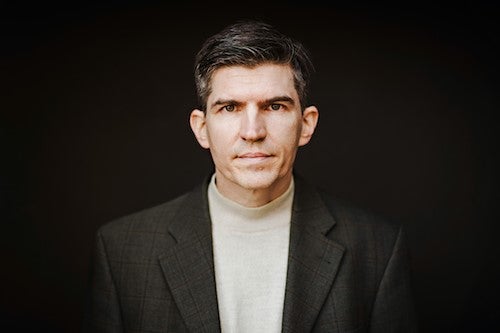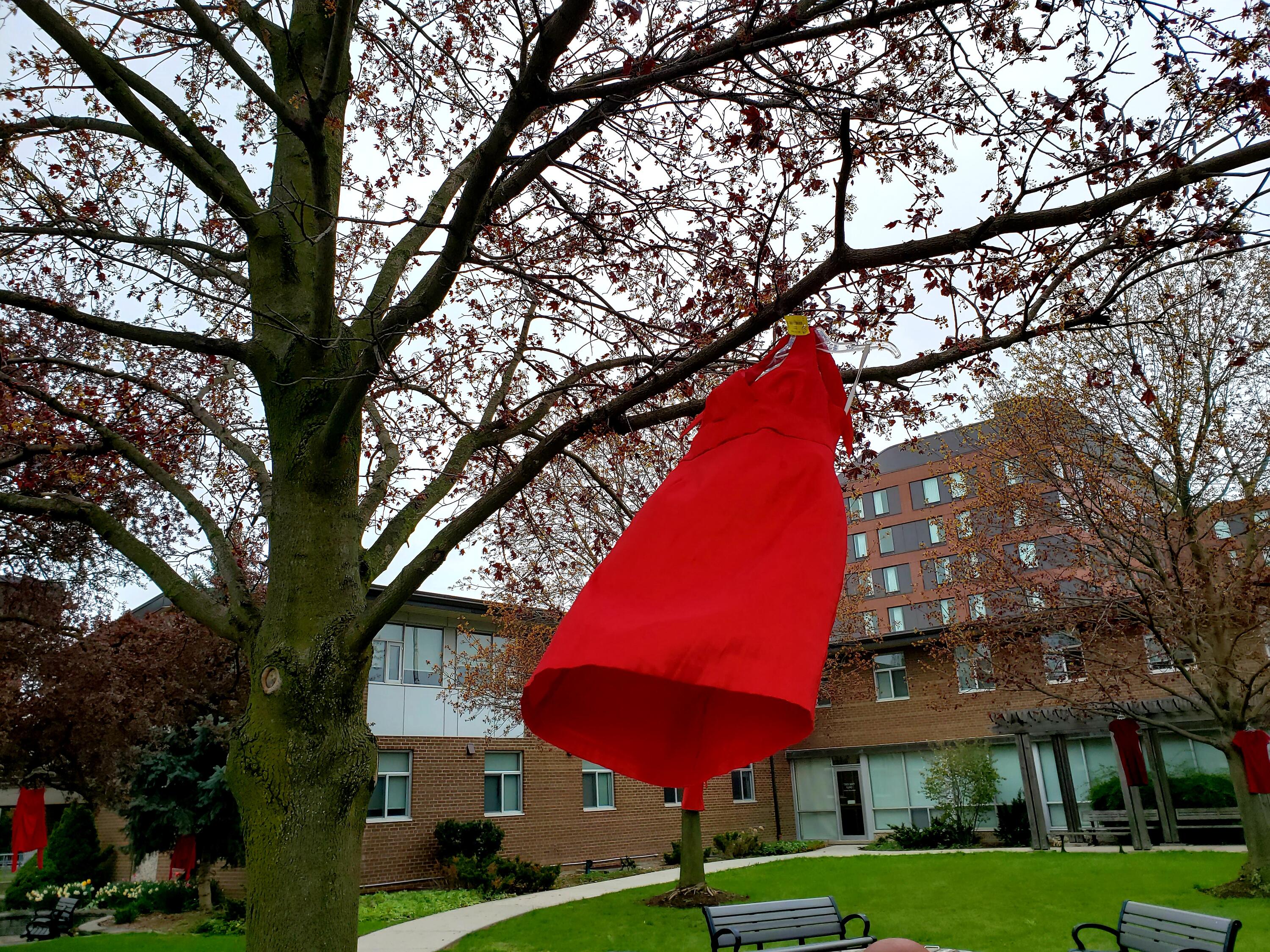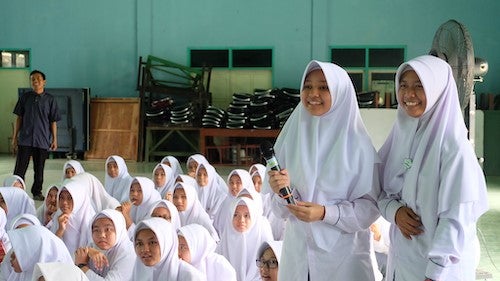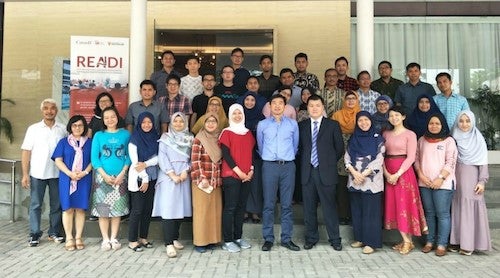Editor:
Brandon Sweet
University Communications
bulletin@uwaterloo.ca
Professor Chris Bauch talks COVID computer modelling

Since the beginning of the pandemic, Professor Chris Bauch has provided important information to government and public-health officials to help them make informed decisions. Professor Bauch and his team in Applied Mathematics create computer models that outline likely consequences of certain decisions and actions. He recently spoke with Pamela Smyth on last week’s episode of the University’s Beyond the Bulletin Podcast to explain what computer modelling is and what it isn’t.
Listen to the full interview in Episode 86 of the Beyond the Bulletin Podcast.
(note: this interview has been condensed for space and clarity)
What is computer modelling?
Computer modelling is basically creating representation of the world inside your computer. Sometimes they're called computer models, sometimes are called mathematical models. We create these computer models or mathematical models to represent important features of real-world systems that we're interested in and understanding better.
How do you take variables into account when you're dealing with a transmissible disease?
What you have to do is you use your experience based on modelling from previous infectious diseases, previous pandemics, previous seasonal outbreaks of diseases to learn what elements your model needs, and which ones are less important. And then you also have to systematically assess the impact of uncertainties. For example, if you are less certain about the probability of mortality or the probability of getting infected, then your model projections have to represent that uncertainty using, for example, best- and worst-case scenarios.
How accurate are mathematical models?
Mathematical models are not crystal balls that can tell you exactly what's going to happen. They range in accuracy, depending upon what you're modelling, and how you're using it. So, for example, if you're talking specifically about mathematical models, they can predict the right trend, they can often be qualitatively correct, even if they aren't quantitatively correct.
You've done a number of models since the pandemic started. Why did you decide to model the things that you modelled?
We chose our models based on questions that were on many people's mind. For example, back last spring and early summer, one of the questions was when and how should we reopen. And we constructed a model to look at different approaches through opening. For example, you could either reopen the entire province at once, or you could reopen different health units at different times. And our model showed that if you reopen different health units at different times, that's potentially a better approach. And the province ended up doing that in the end, even though at first, they wanted to do everything in lockstep.
Is there anything that you've examined that would shine light on what the fall might be like?
No, we haven't looked into the fall yet. The big question is how many people will actually accept the vaccine. And if there's too much vaccine hesitancy, then that will leave a large pool of susceptible persons. And it might be large enough to allow for another wave in the fall or the winter. And so that's my big concern. And it's related to that unknown of how many people actually accept the vaccine, and will it be enough. But if we can get those people vaccinated, if we can overcome that vaccine hesitancy, then we can prevent a fall/winter wave for sure. And even at the University, I think we could go back to in-person learning. But we do have to deal with that issue.
So, what's next for you and your team?
One project is trying to estimate how many lives were saved by the March 2020 lockdown, and also by the one that started on Boxing Day in 2020. We have all the data from the last year that we can use to improve the model and make sure it's realistic. We can adjust the model parameters so that it captures, reproduces what actually happened. For example, in the March 2020, lockdown, our results are showing that if we hadn't locked down and if people hadn't bothered to social distance, we would have had 175,000 deaths in the best-case scenario, instead of the 3,000 that we actually had. So that shows that the lockdown had a huge impact and in saving lots of lives in Ontario.
W Store, Student Success Office launch #UWaterloolife Memories photo contest

A message from W Store and The Student Success Office.
Are you missing UWaterloo campus life us much as we are? Help us relive your favourite #UWaterloolife memories until we can be back together on campus again. From Monday, May 3 to Friday, June 25, W Store and the SSO are collaborating to share your #uwaterloolife memories with the rest of campus.
All UWaterloo community members, students, faculty and staff, are invited to submit their favourite photo(s) featuring a cherished UWaterloo memory for a chance to be featured in the official 2022 University of Waterloo calendar and/or on the @UWaterloolife Instagram account.
Entries may be submitted online to the #UWaterloolife Memories submission page.
Entrants can indicate on the submission page whether they would like their photo(s) to be considered for the W Store Calendar Contest, the @UWaterloolife Instagram account, or both.

Twelve winning photos will be featured in the official 2022 University of Waterloo calendar and printed on-campus at W Print. Each of the winners will receive a copy of the 2022 University of Waterloo calendar. One grand prize photo will be selected by popular vote and the winner will receive a $100 W Store gift card and have their photo featured on the calendar’s cover. In addition to the grand prize winner, two runner-up photos will be selected by popular vote on Instagram to receive a $50 W Store gift card (second place prize) and a $25 W Store gift card (third place prize).
To submit your photo(s) for a chance to be featured in the 2022 University of Waterloo calendar and/or the @UWaterloolife Instagram account, please visit the #UWaterloolife Memories submission page.
For full W Store Calendar Contest details, please visit W Store’s contest rules page.
Questions about this collaboration? Connect with Kayley Marner and Jennifer Halcrow.
REDress project installation a symbol of inequity and hope

St. Jerome's University’s Alumni Court is home to an outdoor display honouring Red Dress Day on May 5.
This is an excerpt of an article originally published on the St. Jerome's University website.
Jamie Black, a Métis multidisciplinary artist based in Winnipeg, Manitoba, had an idea. Create an aesthetic response to the issue of missing or murdered Indigenous women across Canada, by displaying dresses. Red dresses. The colour of blood, anger, spirituality, and love. Five-hundred. One for each woman lost. Hung on display outdoors in public and eye-catching spaces that could not be ignored by people walking by them, and where they could serve as a reminder of the racialization and sexualized violence against Indigenous women.
With this vision and a partnership with the University of Winnipeg the The REDress Project was launched, and over the past 10 years since has travelled across North America and been featured in the media, most recently in the April issue of Vogue magazine. On May 5th, St. Jerome’s University (SJU) honours the message of the project with its own version of a red dress tribute, led by a faculty member with whom the meaning has a personal connection.
Andrew Deman, PhD, is a lecturer in the Department of English at SJU and the University of Waterloo. Together with his family and supported by SJU leadership and the University of Waterloo’s Human Rights, Equity, and Inclusion office’s Indigenous Initiatives, he brought the red dress message to the SJU campus by installing an exhibit in its Alumni Court. Using five dresses donated by The New Hamburg Thrift Centre, Deman and his family were on campus early on the morning of May 5th to honour lost Indigenous women and Black’s vision.
“My wife and two young daughters are Metis, members of the lost generation,” noted Deman. “In recent years we've found that connecting our children to their cultural heritage is a difficult parenting exercise, given the tradition of violence, inequity and - quite frankly - atrocity that is a part of Canada's historic treatment of Indigenous women. The temptation is to have them know nothing about these things - ignorant bliss - but I think it's only through awareness that we can actually move forward.”
Deman added that as a Catholic institution St. Jerome’s has been forthright in its commitment to the gospel values of love, truth, and justice and that current leadership has doubled-down on those commitments in what he described as “a number of heartening ways.”
“There's a fundamental inequity in Canadian society with regard to the treatment of Indigenous women, one that ignores truth and evades justice,” Deman added, “but acknowledging and condemning these inequities is the first step, in my eyes, toward a brighter future. If nothing else, there is love behind this initiative.”
Read the rest of the article on the SJU website
READI or not: actuarial science outreach makes a global impact

Before the READI (Risk Management, Economic Sustainability and Actuarial Science Development in Indonesia) project kicked off in late 2015, Indonesia was in dire need of actuaries. As a country impacted by the threat of extreme weather brought on by global warming, Indonesia was in short supply of actuaries to help identify the climate-related financial risks that could negatively impact pensions and insurance industry solvency. With funding support from Global Affairs Canada and other donors, the University of Waterloo launched READI to meet the needs of Indonesia’s insurance and pension industries.
The project has been a resounding success. Interest in actuarial science in Indonesia has skyrocketed since READI’s inception. Partnering directly with eight Indonesian universities, READI’s mathematics outreach program was able to reach more than 50,000 students, parents, and teachers across the country.
“Before we got there, if young people were good at mathematics they’d usually go into engineering or economics — but they didn’t know about actuarial science,” READI field director Bill Duggan says. “When we started, about 65 students a year were doing actuarial science. Now there’s over a 1,000 per year in 16 undergraduate actuarial science programs across different islands of the country.”
READI was able to overcome several challenges in its implementation. One component of the READI involved the integration of the co-op education model into Indonesian education, which was initially a major challenge for a country that rarely used experiential learning in the past. However, after showcasing Waterloo’s own co-op programs to people in Indonesia, READI was able to support the development of a Ministerial Decree which encouraged universities and technical colleges to develop co-op programs within the country. With universities across Indonesia now being seriously urged to develop co-op education study programs, READI has helped catalyze a paradigm shift in the country’s educational system entirely.
READI was originally projected to end in September 2020, but due to the COVID-19 pandemic, which necessitated remote delivery of all training activities, and with it much lower operating costs, the project extended its activities in Indonesia for another six months. With the cancellation of in-person events, READI pivoted to virtual meetings, webinars and e-learning, allowing the project to transition without skipping a beat, and in many cases considerably increasing geographic reach and involving larger numbers of participants.
Budget savings achieved as a result of the pandemic were used to add supplementary training activities. All training activities in Indonesia have now been completed with one final initiative, to send Indonesian professors to follow a Master’s program at Waterloo, to wind up by the end of August 2021.

The impact of the READI project has been highly significant for both Indonesia and the University of Waterloo. “The reputation that UWaterloo now has in Indonesia, courtesy of the READI project, is huge,” says READI project director Jean Lowry. “It opens up a whole new avenue of having students coming from Indonesia to the University of Waterloo.”
Looking to the future, an International Development Group (IDG) created by Duggan and Lowry which, at least initially, will be based in Waterloo’s Faculty of Mathematics, has been actively pursuing new international projects in a number of different locations. Continuing to work closely with Global Affairs Canada, the IDG seeks to develop additional projects that will create impacts across the world while expanding opportunities for faculty and staff at Waterloo to work on these additional projects.
“We’re always in the habit of creating new projects,” says Lowry. There’s almost an obligation on the part of universities and countries like Canada to reach out to be part of global solutions. We have an obligation to share what we know.”
Link of the day
When and Where to get support
Students can visit the Student Success Office online for supports including academic development, international student resources, leadership development, exchange and study abroad, and opportunities to get involved.
Instructors can visit the Keep Learning website to get support on adapting their teaching and learning plans for an online environment.
Course templates are available within your course in LEARN to help you build and edit your content and assignment pages quickly.
The following workshops, webinars, and events are offered by the KL team (CTE, CEL, ITMS, LIB):
- Independent Remote Course Design Essentials, self-directed, continuous self-enrollment course in LEARN.
- Remote Teaching Support Drop-In, weeks of April 26th and May 3rd
- Getting Ready to Facilitate Online Courses: TA Training, beginning Monday, May 3
- LEARN for TAs (CTE6550), Tuesday, May 18, 1:30 p.m. to 3:00 p.m.
Employees can access resources to help them work remotely, including managing University records and privacy of personal information. Here are some tips for staying healthy while working from home.
Stay informed about COVID cases on campus by consulting the COVID case tracker.
The Writing and Communication Centre has virtual services and programs to help undergrads, grad students, postdocs and faculty members with academic writing.
- Meet with writing advisors in one-to-one appointments to brainstorm, draft, revise, and polish. No time for an appointment? Try email tutoring for undergrads.
- Beat isolation and make writing progress at weekly Virtual Writing Cafés for grad students and faculty or PJ-Friendly Writing Groups for Undergrads.
- Take an online workshop or apply to our popular Dissertation Boot Camp program.
- Faculty can request custom in-class workshops for their courses, or the WCC can facilitate any existing workshops for student groups.
Co-op students can get help finding a job and find supports to successfully work remotely, develop new skills, access wellness and career information, and contact a co-op or career advisor.
The Centre for Career Action assists undergraduates, graduate students, postdocs, staff, faculty, and alumni through navigating career services that are right for them. You can attend a one-on-one appointment or same day drop-in session at the CCA for assistance with cover letter writing, career planning and much more. You can also book an appointment online or visit our Live Chat to connect with our Client Support Team. The CCA is here to help you.
If you feel overwhelmed or anxious and need to talk to somebody, please contact the University’s Campus Wellness services, either Health Services or Counselling Services. You can also contact the University's Centre for Mental Health Research and Treatment. Good2Talk is a post-secondary student helpline available to all students.
The Library has published a resource guide on how to avoid information overload.
The Faculty Association of the University of Waterloo (FAUW) continues to advocate for its members. Check out the FAUW blog for more information.
The University of Waterloo Staff Association (UWSA) continues to advocate for its members. Check out the UWSA blog for more information.
The Indigenous Initiatives Office is a central hub that provides guidance, support, and resources to all Indigenous and non-Indigenous campus community members and oversees the university Indigenization strategy.
The Waterloo Indigenous Student Centre, based at St. Paul’s University College, provides support and resources for Indigenous students, and educational outreach programs for the broader community, including lectures, and events.
WUSA supports for students:
Peer support - MATES, Glow Centre, RAISE, Women’s Centre - Visit https://wusa.ca/peersupport to book an appointment
Bike Centre – Will be reopening soon.
Campus Response Team, ICSN, Off Campus Community and Co-op Connection all available online. Check https://wusa.ca for more details.
Food Support Service food hampers are currently available from the Turnkey Desk on weekdays from 7:30 a.m. to 7:00 p.m. in the Student Life Centre. If you have any questions please email us at foodsupport@wusa.ca.
Centre for Academic Policy Support - CAPS is here to assist Waterloo undergraduates throughout their experience in navigating academic policy in the instances of filing petitions, grievances and appeals. Please contact them at caps@wusa.ca. More information is available.
WUSA Commissioners who can help in a variety of areas that students may be experiencing during this time:
- Equity – equity@wusa.ca
- Co-op and Experiential Affairs – coop.affairs@wusa.ca
WUSA Student Legal Protection Program- Seeking legal counsel can be intimidating, especially if it’s your first time facing a legal issue. The legal assistance helpline provides quick access to legal advice in any area of law, including criminal. Just call 1-833-202-4571.
Empower Me is a confidential mental health and wellness service that connects students with qualified counsellors 24/7. They can be reached at 1-833-628-5589.
When and Where (but mostly when)
Healthy Warriors at Home (Online Fitness)
Drop-in to Warrior Virtual Study Halls on Wednesdays from 5:30 p.m. to 7:00 p.m. Come together in this virtual space to set goals and work independently or in groups each week.
Renison English Language Institute continues to offer virtual events and workshops to help students practice their English language skills.
Warriors vs. Laurier Blood Donation Battle. Join your fellow Warriors, donate blood and help us win the Blood Battle against Laurier for a second year in a row. Set up a profile or add the PFL code: UNIV960995 to your account if you have a blood.ca account already. Questions? Contact WarriorsInfo@uwaterloo.ca.
Dissertation Boot Camp, Friday, May 7.
IT Seminar: MS Power BI Analytics at UW, Friday May 7, 9:00 a.m. to 9:45 a.m. Join online.
Virtual Writing Café, Tuesday, May 11, 9:00 a.m.
Return to Campus Virtual Town Hall, Tuesday, May 11, 1:30 p.m.
Breaking Free From Low Mood, Tuesday, May 11, 2:30 p.m.
PJ-Friendly Writing Groups, Wednesday, May 12, 10:00 a.m.
36th Annual Meeting of the Canadian Biomaterials Society, Thursday, May 13 to Saturday, May 15. Hosted by the University of Waterloo.
Indigenous-Mennonite Encounters: Conference Preview, Thursday, May 13, 10:00 a.m.
Engineering Term Olympics, Friday, May 14 and Saturday, May 15.
Lectures in Catholic Experience presents The Black Church in Canada featuring Carol Duncan, PhD, professor, Department of Religion and Culture, Wilfrid Laurier University, Friday, May 14, 7:30 p.m., online.
Centering Indigenous engagement in the work of wellbeing and health promotion, Monday, May 17, 1:00 p.m.
Ballet After Dark: Strength & Healing Through the Arts, Tuesday, May 18, 1:00 p.m. to 2:30 p.m.
Health Challenges Forum, Tuesday, May 18, 2:00 p.m.
Warriors Athletics and Recreation Spring Virtual Open House. Tuesday, May 18, 4:00 p.m. Learn about how to stay active and engaged this spring term. Register now.
How faculty members can counter anti-Black racism in universities, Wednesday, May 19, 12:00 noon to 1:00 p.m.
NEW - Resilient Warriors Virtual Panel presented by President’s Golf.Wednesday, May 26, 4:00 p.m. Panel featuring Mandy Bujold (Olympic Boxer), Dr. Kim Dawson (Mental Performance Consultant), Tre Ford (Student-Athlete) and Garrett Rank (NHL Referee, Canadian Amateur Golfer). Free tickets for students, staff, faculty and Alumni. Register now.
PhD oral defences
Pyschology. Shiu Man Kwok, "Handle with Care: Agreeableness and Responses to Hurt Feelings." Supervisor, Joanne Wood. Available upon request from the Faculty of Arts, Graduate Studies and Research Officer. Oral defence Friday, May 14, 10:00 a.m.
Kinesiology. Anthony Tapper, "Examining behavioural and electrophysiological markers of mental workload in individuals with and without a history of concussion." Supervisor, Ewa Niechwiej-Szwedo. Email Health Graduate Administration for a copy. Oral defence Friday, May 21, 9:00 a.m.
School of Public Health and Health Systems. Katie Burns, "Examining how changes in school-level intramurals impact youth physical activity among Ontario youth over time: A natural experiment evaluation from the COMPASS Study." Supervisor, Scott Leatherdale. Email Health Graduate Administration for a copy. Oral defence Thursday, June 10, 12 noon.